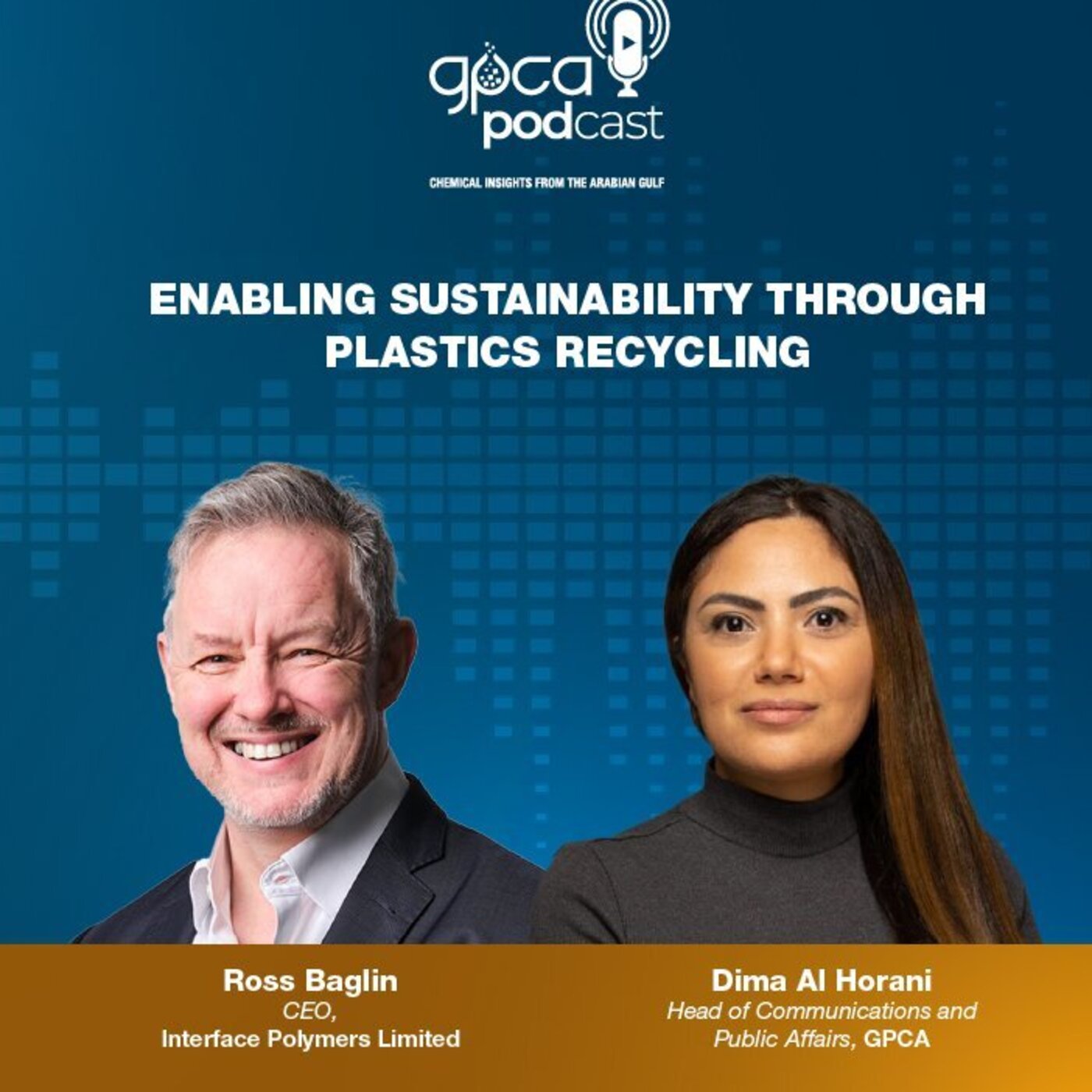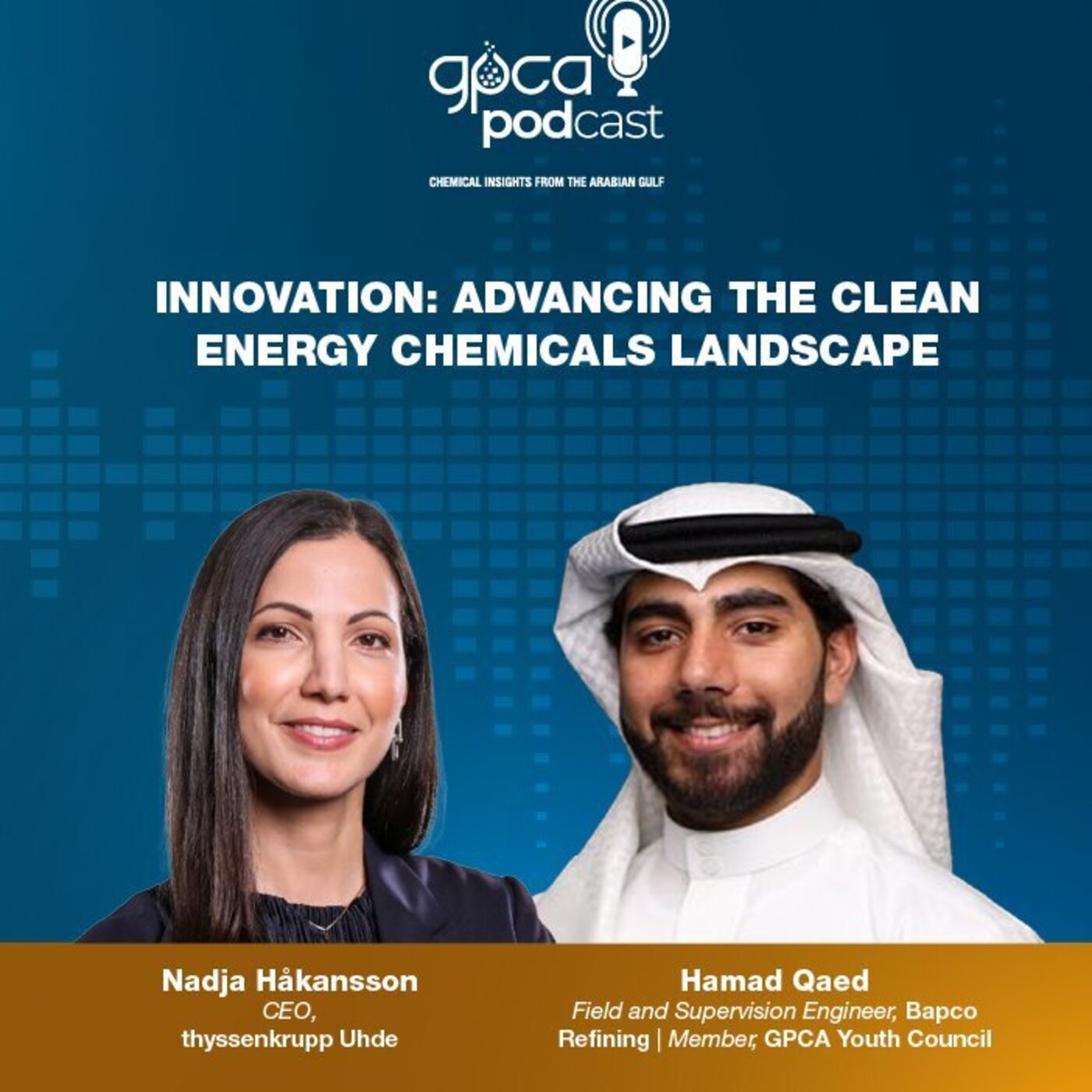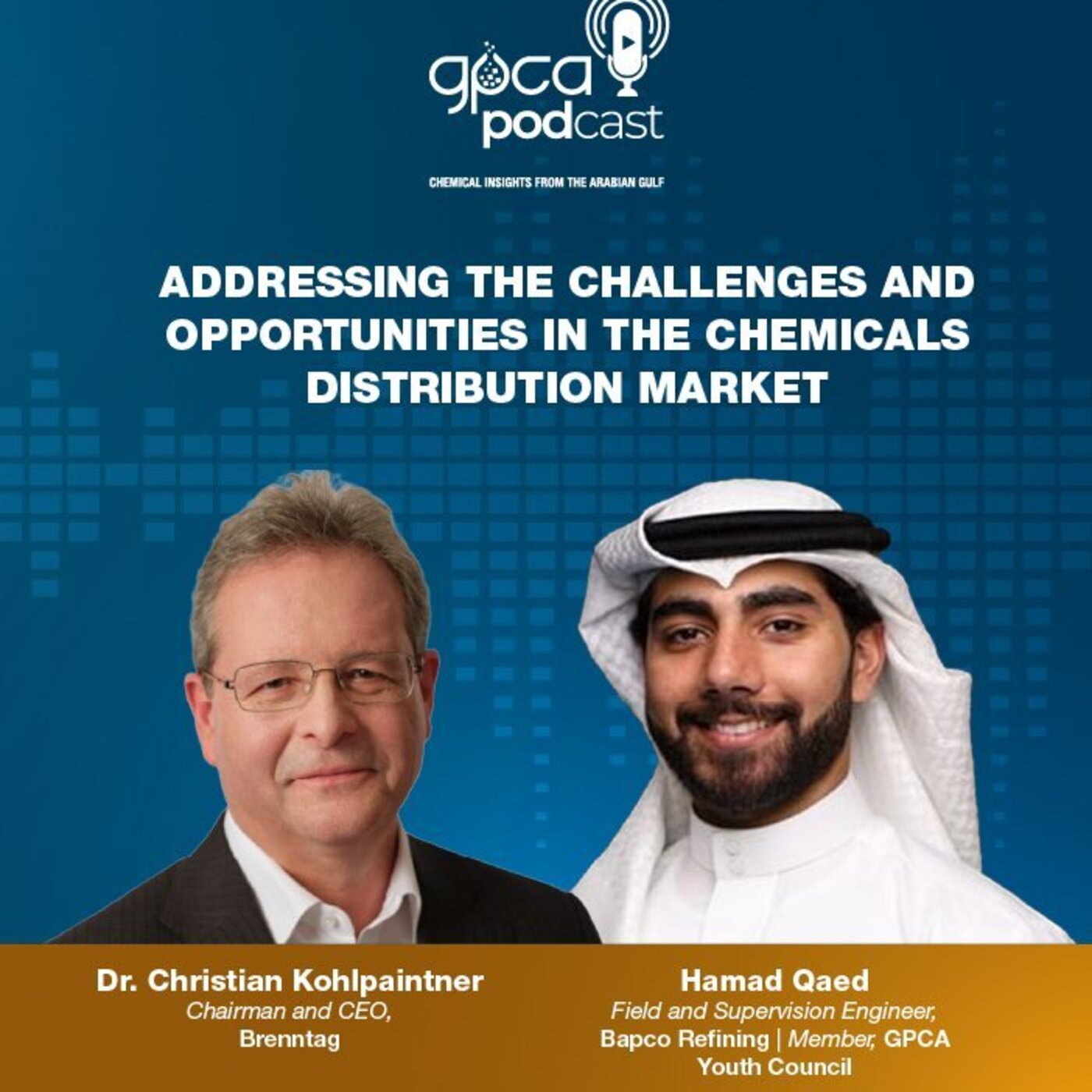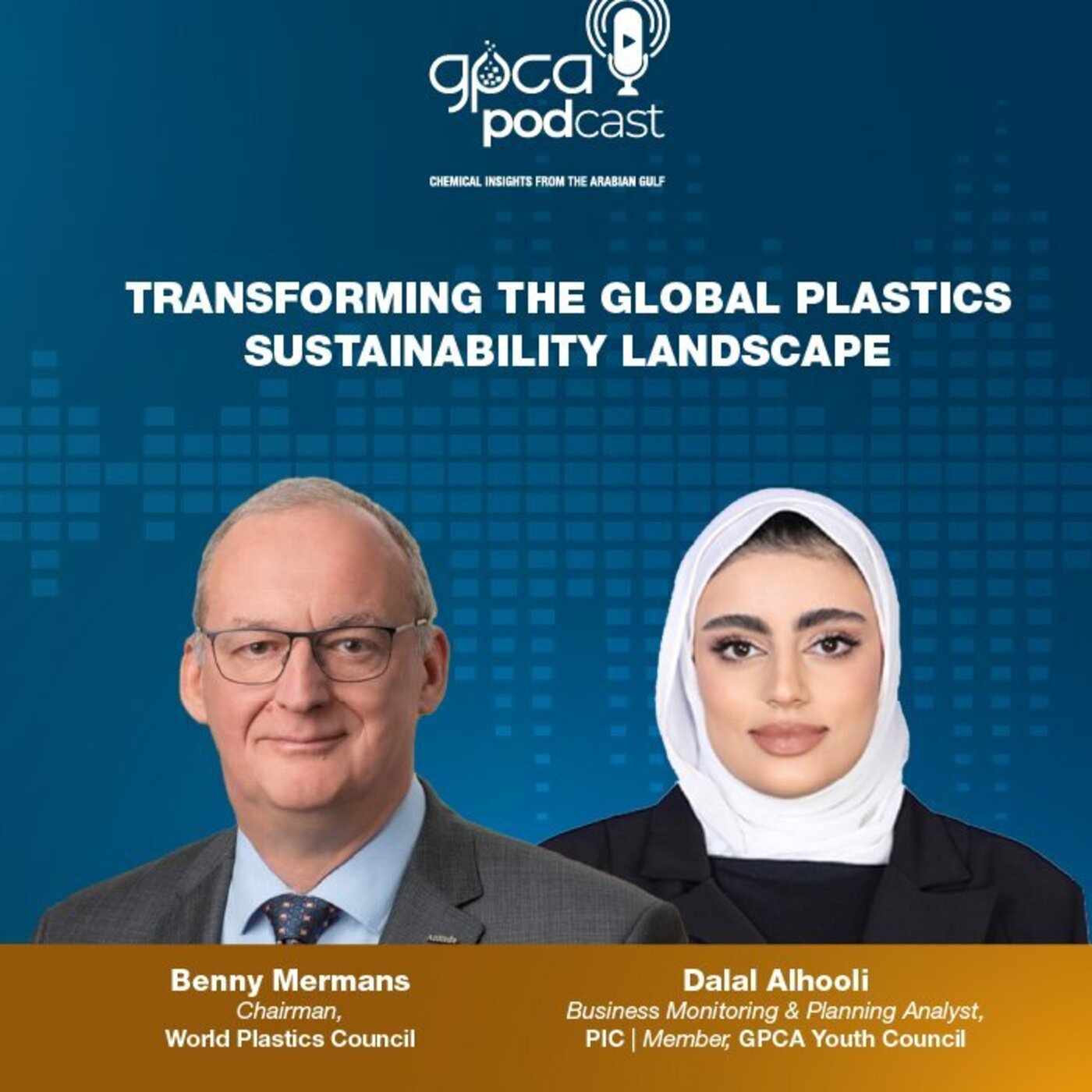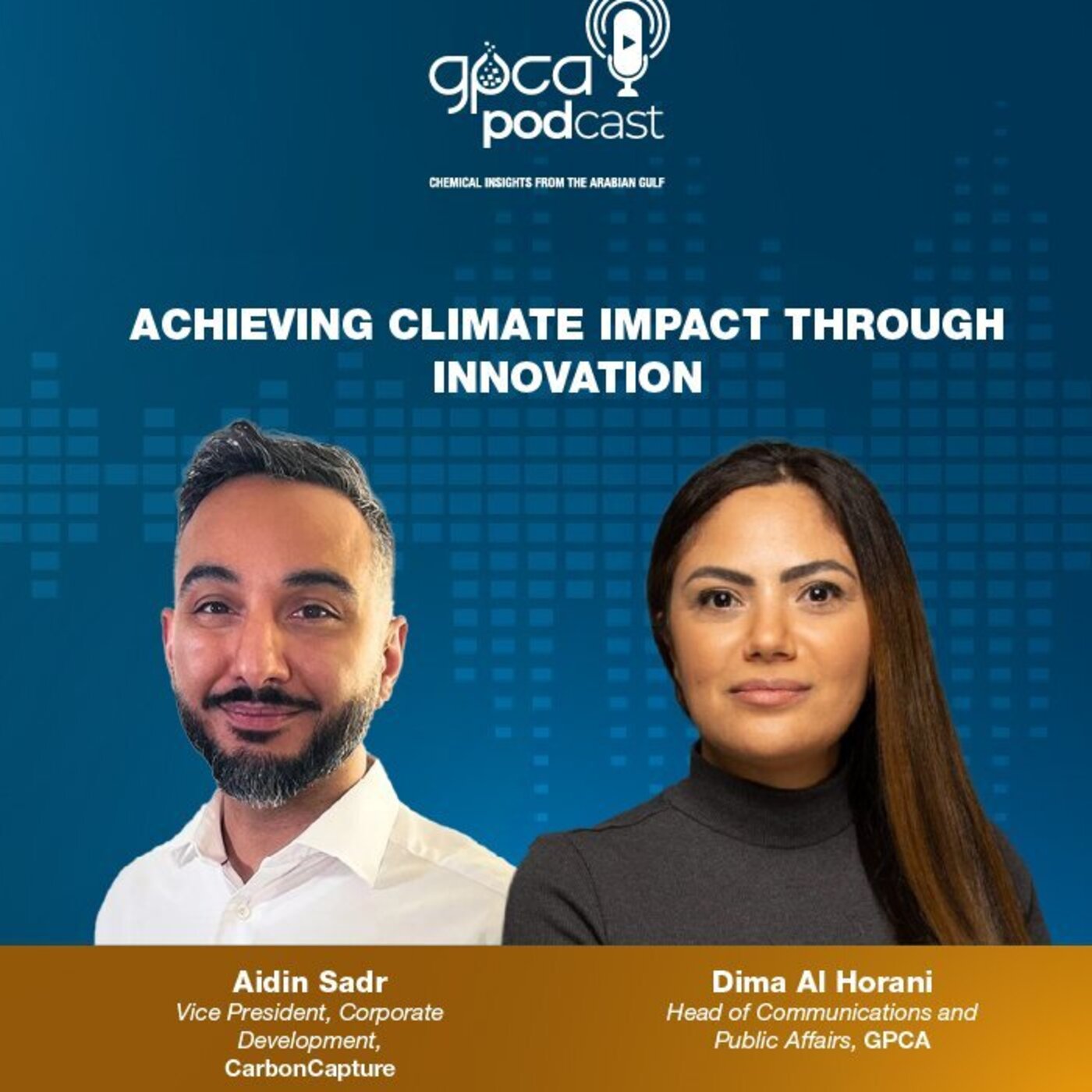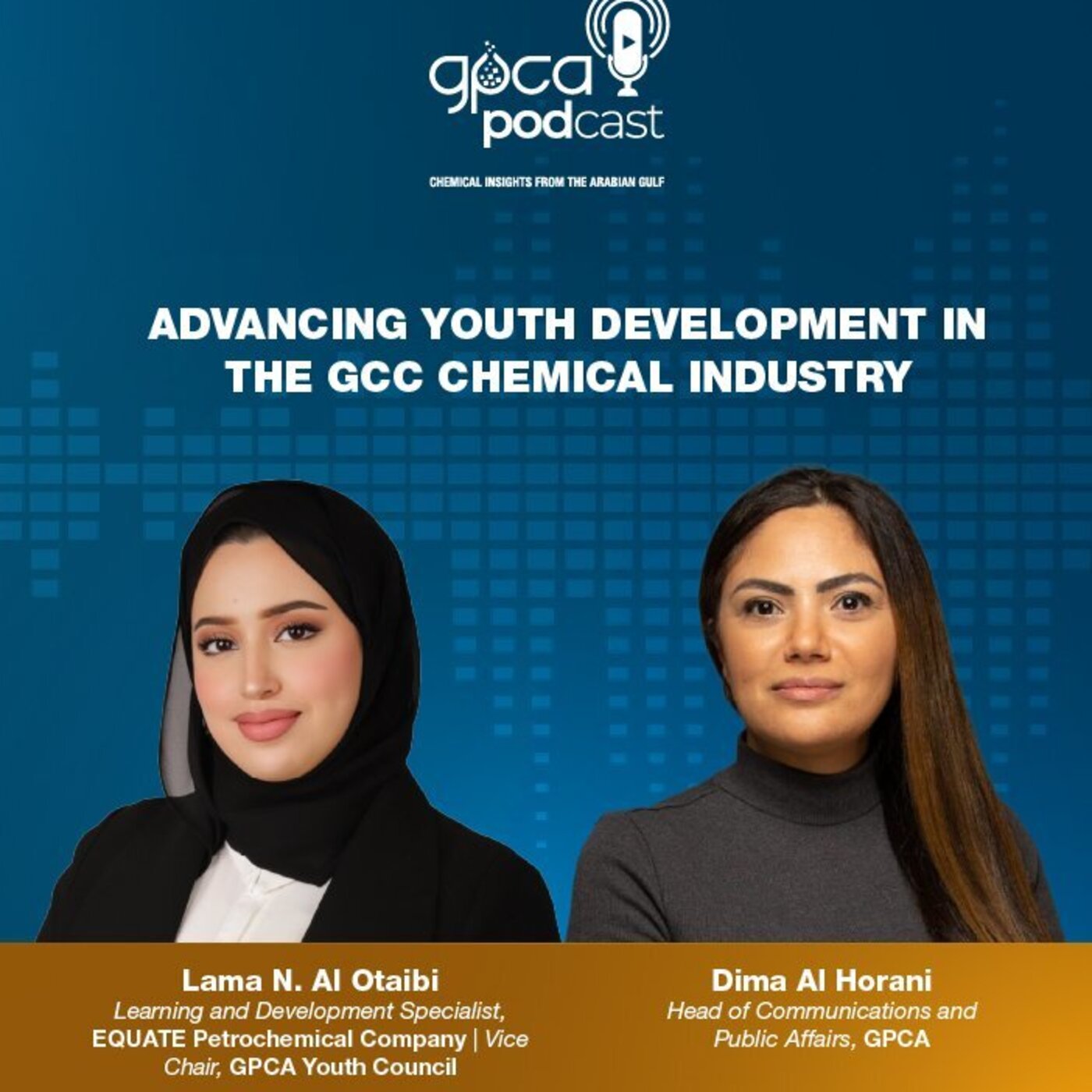Discover GPCA Podcast
GPCA Podcast

GPCA Podcast
Author: GPCA
Subscribed: 9Played: 110Subscribe
Share
© Gulf Petrochemicals and Chemicals Association
Description
This podcast is proudly presented by the Gulf Petrochemicals and Chemicals Association, the voice of the downstream hydrocarbon industry in the Arabian Gulf. Each episode will provide you with exclusive insights on the latest industry trends, and stimulate conversations, featuring industry leaders and experts from the region and the world.
52 Episodes
Reverse
In today’s world, sustainability is all around us — in headlines, boardrooms, and brand campaigns. But in the petrochemical and chemical industry, it’s a word that often sparks debate. The term greenwashing has become both a critique and a challenge. While companies make real investments in recycling technologies, carbon capture, and circular packaging, many efforts to improve our carbon footprint are dismissed as marketing tactics or accused of lacking real impact.
For young professionals entering the field, this presents a complex dilemma. How do we take pride in an industry that powers economies and innovation, while navigating accusations of greenwashing? What counts as genuine progress and what is just a label?
This podcast sets out to unpack the meaning of greenwashing and explore its implications across industry, policy, and society. We’ll examine whether recyclable and biodegradable packaging are genuine solutions, whether carbon capture is a game-changer or a “distraction”, and how media narratives shape what we believe about sustainability. And ultimately, we’ll tackle the hardest question of all: can petrochemical companies truly be part of a sustainable future?
Guest
Abdallah Abou-Haidar
enior Regulatory Affairs,
SABIC
Product Stewardship
Sub-Committee Chairman,
GPCA
Guest
Andrew Noel
Editor
chemicalESG
www.chemicalesg.com
Host
Ameena Fahad Al-Darwish
EDC/VCM Production Day
Supervisor
EDC/VCM Plant, QAPCO |
Member, Sustainability
Sub-Council, GPCA Youth Council
As the global climate transition accelerates, few industries face a transformation as profound as the chemical
sector — especially in the Gulf Cooperation Council (GCC) region. With hydrocarbons serving as both energy
source and feedstock, the industry sits among the top CO₂ emitters globally. This dual reliance makes
decarbonization uniquely complex, particularly in the GCC, where climate policy has emerged more recently.
In this episode of the GPCA Podcast, produced in partnership with dss+, we will explore why the region’s
journey is different, and how GCC chemical companies are navigating a landscape shaped by policy, rising
climate risks, and mounting pressure to adapt. Drawing from an upcoming GPCA and dss+ report “Navigating
the Climate Transition in the GCC’s Chemical Industry”, we’ll unpack how leading firms are turning climate risks
into strategic advantage. We’ll explore the enabling technologies, the risks and opportunities, and discuss
which are driving the most tangible impact today.
Experts will also address the emerging role of circular supply chains and how sustainable finance tools are
reshaping how companies fund and future-proof their operations. As GCC chemical companies seek to align
external signals with internal change, we will ask – what gives industry leaders hope that the region can not
only catch up, but lead globally.
Guest
David Rochat,
Global Director,
Sustainability Services,
dss+
Dr. Gerhard Bolt,
Global Decarbonization Lead,
dss+
Host
Dr. Sana Ben Kebaier,
Head of Economic
Research Department
For more podcasts and the latest insights on the regional chemical markets, visit www.gpca.org.ae/thought-leadership
The global trade landscape is in flux, with rising tariffs, geopolitical tensions, and shifting alliances disrupting the chemical industry like never before. For the GCC players, these changes bring both challenges and opportunities, urging them to rethink strategies, explore new partnerships, and adapt to an evolving world order.
In this episode of the GPCA Podcast, we take a deep dive into the latest US tariff policies, retaliatory measures from China and other parts of the world, and their ripple effects across international trade corridors. From supply chain fragmentation to emerging investment flows, we uncover how GCC chemical exporters can navigate volatility and secure long-term resilience.
With expert insights and real-world examples, we analyze the macroeconomic shifts shaping the industry, including geopolitical tensions, evolving compliance frameworks, and the transition toward alternative markets. What are the key levers for GCC chemical producers to stay competitive? How can companies optimize localization efforts and tap into new trade agreements? And where does sustainability fit into this rapidly changing narrative?
Whether you’re an industry professional, policymaker, or investor, this episode equips you with the intelligence to stay ahead of the curve. Join us for an in-depth discussion on trade tensions, supply chain reinvention, and the future of GCC petrochemicals in the new global paradigm.
Guest
Charles Julien, Partner,
White & Case
Guest
Mariana Santos Moreira,
Thought Leadership Director,
Chemical Market Analytics
by OPIS
Host
Mohamed Zaman
Committees Affairs
Specialist, GPCA
For more podcasts and the latest insights on the regional chemical markets, visit www.gpca.org.ae/thought-leadership
In an era of heightened regulatory scrutiny and digital transformation, the chemical industry is at a crossroads. Trade and supply chain leaders in the GCC region are navigating a rapidly evolving landscape, where compliance complexities and supply chain innovations intersect. The rise of digitalization, automation, and AI-driven analytics is redefining efficiency, resilience, and transparency across global chemical supply chains. However, these advancements are occurring against the backdrop of increasing regulatory pressures, including sanctions compliance, financial regulatory risks, and ethical business practices.
In this episode of the GPCA podcast we will hear from two industry experts—one from a major chemical producer and another from a consultancy specializing in compliance, trade regulations, and financial fraud—to explore the intersection of smart supply chain innovations and the evolving compliance landscape.
To explore these trends, they’ll address:
• The new era of chemical supply chains and future-proofing supply chains in the GCC region
• The expanding compliance challenges
• Bridging the gap between smart supply chains and compliance
• Strategies for enhancing transparency and resilience in global supply chains
• The future of smart supply chain innovations in the chemical industry
Guest
Haitham Fouad
Head of Supply Chain, Logistics Procurement and Facility Management – Middle East, BASF
Guest
Mohamed Daoud
Director, Industry Practice Lead, Financial Crime Compliance, Moody's
Host
Noora Mukhtar
Senior Research Specialist,
GPCA
For more podcasts and the latest insights on the regional chemical markets, visit www.gpca.org.ae/thought-leadership
In today’s fast-evolving industrial landscape, innovation plays a crucial role in molding the future of sectors like
chemicals, particularly through a focus on sustainability and adapting to changing global dynamics. As the
industry increasingly integrates cutting-edge technologies and fosters fresh ideas, it faces the dual challenge of
aligning with global sustainability targets while responding to the heightened demand for socially responsible
business practices. This shift presents both opportunities and challenges as companies seek to evolve and stay
competitive in a rapidly changing market.
To explore these trends, GPCA brings together two leading industry experts, who will delve into the implications
of innovation on the chemical industry’s future. Drawing on their extensive experience, they’ll address:
•The role of innovation in driving sustainability and industry transformation
•The integration of emerging technologies into operations
•Strategies for meeting global sustainability goals
•The growing demand for socially responsible business practices and its impact on the chemical industry
Guest:
Dr. Wolfram Stichert
CEO, hte GmbH
Dr. Holger Bengs
CEO and Managing
Partner, BCNP
Consultants GmbH
Host
Mohamed Zaman
Senior Committees
Affairs Specialist, GPCA
For more podcasts and the latest insights on the regional chemical markets, visit www.gpca.org.ae/thought-leadership
In this special episode of the GPCA Podcast held on the sidelines of the 18th Annual GPCA Forum in Muscat, Oman, Ross Baglin, CEO, Interface Polymers Limited, sat down with Dima Al Horani, Head of Communications and Public Affairs, GPCA, to share what it means to be shortlisted in the Circular Economy category of the inaugural GPCA Startup Nexus and how the company’s technology is advancing plastics recycling globally.
In his recent conversation, he covers:
- Interface Polymers’s contribution to sustainability and the circular economy and what makes the company and its technology so unique
- The role of entrepreneurship and innovation in providing a solution to the challenges facing the chemical industry
- Key challenges and enablers in advancing the circular economy and much more
In this special episode of the GPCA Podcast held on the sidelines of the 18th Annual GPCA Forum in Muscat, Oman, Mais Haddadin Finn, Global Sustainability Lead, NexantECA, spoke to Dalal Alhooli, Business Monitoring & Planning Analyst, PIC, and Member of the GPCA Youth Council, about the challenges and opportunities that faced the market in 2024 and how the chemical industry can prepare for a more prosperous and sustainable year ahead.
In this special segment, they discussed:
- The state of the chemical industry in Europe and globally and key developments that shaped the landscape in 2024
- How competitive is the recycled plastic market currently and what are some of the barriers to its growth?
- CBAM and its impact on regional chemical producers – How to prepare for the impending changes?
- Predictions for 2025: key trends that will continue to impact the industry
- The importance of Diversity and Inclusion, and much more
In this special episode of the GPCA Podcast held on the sidelines of the 18th Annual GPCA Forum in Muscat, Oman, Nadja Håkansson, CEO, thyssenkrupp Uhde, met with Hamad Qaed, Field and Supervision Engineer, Bapco Refining, and Member of the GPCA Youth Council, to discuss the importance of innovation and what it means to her, her plans for the company in 2025 and everything in between.
In an insightful conversation, she addressed:
- What steps can the chemical industry take to accelerate the green transformation and reduce CO2 emissions?
- Is investment in technology the "silver bullet" in advancing our net-zero ambitions, or are there other necessary enablers to enact a true sustainable transformation?
- The role of collaboration and technology development in our drive to net-zero?
- 2025 business plans and importance of Diversity and Inclusion and much more
In this special episode of the GPCA Podcast held on the sidelines of the 18th Annual GPCA Forum in Muscat, Oman, Dr. Christian Kohlpaintner, Chairman and CEO, Brenntag, sat down with Hamad Qaed, Field and Supervision Engineer, Bapco Refining, and Member of the GPCA Youth Council, to discuss agility and resilience in the chemical distribution industry.
He also covered:
-The challenges presented by the COVID-19 pandemic and how the company adapted to these challenges over the past five years
-The importance of diversification and globalization for the chemical distribution industry
- The challenges and opportunities that underscored the market in 2024
- Predictions for 2025 and the profile of recovery and much more
In this special episode of the GPCA Podcast held on the sidelines of the 18th Annual GPCA Forum in Muscat, Oman, Jai Shroff, Chairman and CEO, UPL, sat down with Dalal Alhooli, Business Monitoring & Planning Analyst, PIC, and Member of the GPCA Youth Council, to discuss food security and sustainable agri-nutrient production.
In this insightful podcast, he also touched upon:
- The role of the agri-nutrient sector in addressing demand for food
- What are some of the most pressing challenges facing agri-nutrient producers?
- The role of sustainable agriculture technology in supporting food production
- The importance of education and collaboration in accelerating technology adoption in the agriculture sector
- The role of policymakers and regulation and much more
In this special episode of the GPCA Podcast held on the sidelines of the 18th Annual GPCA Forum in Muscat, Oman, Benny Mermans, Chairman, World Plastics Council, sat down with Dalal Alhooli, Business Monitoring & Planning Analyst, PIC, and Member of the GPCA Youth Council, to discuss the INC-5 in Busan and its implications for plastics producers.
He also addressed:
- Key enablers to plastics circularity and addressing plastic waste
- What can stakeholders do today to advance recycling and collaborate more effectively on managing plastic waste?
- Advocacy priorities for the WPC
- Importance of collaboration
In this special episode of the GPCA Podcast held on the sidelines of the 18th Annual GPCA Forum in Muscat, Oman, Aidin Sadr, Vice President, Corporate Development,
CarbonCapture, sat down with Dima Al Horani, Head of Communications and Public Affairs, GPCA, to share what it means to be shortlisted in the Climate Action category of the inaugural GPCA Startup Nexus and how the company is harnessing entrepreneurship and innovation to help abate climate change.
In this engaging conversation, Aidin touched upon:
- The role of entrepreneurship and innovation in providing solutions to the chemical industry
- Enablers for growth and innovation in the startup space
- Challenges and enablers in advancing decarbonization and much more
In this special episode of the GPCA Podcast held on the sidelines of the 18th Annual GPCA Forum in Muscat, Oman, Lama N. Al Otaibi, Learning and Development Specialist, EQUATE Petrochemical Company, and Vice Chair of the GPCA Youth Council, sat down with Dima Al Horani, Head of Communications and Public Affairs, GPCA, to share the latest updates about the GPCA Youth Council and what were some of the Council’s key initiatives and achievements in 2024.
The conversation ranged from:
- New partnerships and alliances that the Youth Council formulated in 2024
- The GPCA Youth Forum and plans for the forum in 2025
- The importance of the platform and the youth’s contribution to a more sustainable future
- The GPCA Youth Council's priorities and objectives in 2025
Ammonia is a key component in the green energy transition. A chemical compound of nitrogen and hydrogen, ammonia is a vital raw component in the production of numerous key nitrogen compounds. It is produced worldwide, with its most common use being agri-nutrients, considered as the cornerstone of food security in today’s landscape.
Historically, ammonia has been produced through Fluid Catalytic Cracking (FCC), a process utilized in ammonia production plants to convert crude oil in order to extract the hydrogen atoms and convert it into ammonia. The traditional process releases high amounts of CO2 to the atmosphere. The production of ammonia where CO2 is released to the atmosphere is labelled as grey ammonia. Globally, countries and industries pledged to reduce their CO2 emissions to combat climate change. In order to combat climate change, countries have pledged to net-zero production after the climate change conference in Paris 2015. In an attempt to reduce the CO2 emissions resulting from ammonia production, the CO2 product gets captured. This reduces the CO2 emissions as the CO2 can be stored or utilized instead of releasing it to the atmosphere. Producing ammonia while capturing the CO2 is labelled as blue ammonia.
Ammonia has the potential to become an important zero-carbon fuel for maritime shipping, as well as an energy and transport carrier given its higher volumetric energy density compared to hydrogen. What are the enablers and challenges in producing blue and green ammonia? What is the chemical industry’s role in driving the energy transition and where do we stand today on our journey to net-zero? To answer these questions and more, Mohamed Almoosawi, Mechanical Supervisor, GPIC, and Co-Chair of the Sustainability Sub Council, GPCA Youth Council, sat down with Munif Al Munif, General Manager, T&I, SABIC Agri-Nutrients, to shed more light on this important topic and get the latest updates.
Today, the WTO has 166 members and 23 member countries with observer status. Between them they account for 98% of world trade in goods & services. The global integration of economies has been a key driver of global GDP growth, but it has also introduced instabilities as the benefits of globalization have not been uniformly distributed across societies. As a result of this, there have been winners and losers at the global stage, leading to varying levels of economic prosperity. This disparity has sparked debates and movements advocating for more localized and protectionist economic policies which lead to barriers that can reverse certain elements of globalization. This has the potential of impacting the chemicals trade, with drastic ramifications for the GCC region, which is largely export-oriented.
To address these questions and more, GPCA has bought together two leading industry experts, Lisa Schroeter Senior Government Affairs Director, Dow | Member, GPCA International Trade Committee and John Mathew Vice President, Business Development Chemical Market Analytics by OPIS, a Dow Jones Company, in conversation with Mohamed Zaman Senior Committees Affairs Specialist, GPCA, who delve into the implications of deglobalization on trade. Drawing upon their extensive experience, they address:
- The challenges and opportunities in chemicals trade today
- Key contributors to the reversal of elements contributing to a free trade/investment environment
- The need for market liberalization and the removal of tariffs
- The role of the WTO and the need for its modernization
Plastics are under the spotlight once again with the INC-4 concluding in Ottawa in April and the INC-5 set to take place in Busan, South Korea this December. Important issues will come under discussion to form part of a global treaty on plastics which will shape the industry’s future for decades to come.
Just as the energy transition looks at new forms of energy to power our planet, a materials transition is taking place in how we produce and consume products, with far-reaching implications on plastics. As global legislation, end-user demand and industry innovation continue to drive impact on the reuse, reduce and recycling of consumer packaging, the sector is finding itself in the midst of a perfect storm.
What are the drivers that will accelerate the pace of change and how will they impact virgin and post-consumer plastics? To answer these questions, and more, GPCA has hosted two industry experts, each of whom shares extensive insights from their own fields into:
- The materials transition and what it means for plastics
- The impact of legislation on the industry globally and within the GCC region
- The role of EPR schemes, chemical recycling, product design and innovation in accelerating the transition
- What will be the hurdles, barriers and opportunities in this fast-moving transition?
https://www.gpca.org.ae/gpca-podcast/
Supply chains all over the world have witnessed an unprecedented level of disruption. Geopolitical tension,
rising cost, nearshoring and onshoring, ongoing talent shortages and trade wars have all come together to
create an environment in which agility and efficiency are the key to success in any supply chain operation.
Sustainability requirements are adding further pressure on supply chain leaders, bringing net-zero and ESG
imperatives to the forefront of the industry agenda. With a future more uncertain than ever before, what will
the next frontier in GCC chemical supply chains look like?
To address this question and more, GPCA has brought together leading industry experts, who’ll delve into the
latest considerations and disruptions that will shape the next supply chain Renaissance. Drawing upon
decades of supply chain leadership experience across the region, they’ll address:
➢ In today’s uncertain world, what are the key imperatives for regional supply chain leaders?
➢ How can the industry transform its chemical and petrochemical supply chains to ensure business
continuity, eliminate inefficiencies and mitigate supply chain risks?
➢ How can we evaluate the state of the GCC’s supply chain landscape today, what is the role of regulations,
and much more.
Guest:
Saleh Al Shabnan
Chairman of the Board,
Saudi Supply Chain &
Procurement Society
Arun Bruce
Co-Founder & CEO
Transformation X
Host
Noora Mukhtar
Research Specialist
GPCA
For more podcasts and the latest insights on the regional chemical markets, visit https://www.gpca.org.ae/thought-leadership/
The process of energy transition presents a monumental challenge and an incredible opportunity, as the world seeks to reduce its dependence on fossil fuels. At the heart of the energy transition lies the chemical industry. On one hand, the chemical sector is vital to enabling sustainable solutions like the production of clean energy technologies, and minimizing food waste, therefore significantly reducing CO2 emissions. On the other hand, the chemical sector is very energy intensive. It is the largest industrial energy consumer and the third largest industry subsector in terms of direct CO2 emissions1, making it hard-to-abate.
Beyond direct emissions, the industry faces a significant challenge tackling "Scope 3" emissions. These emissions account for half of its total emissions and include all activities along an organization's value chain or its assets. These emissions are also the most difficult to address.
Recent global commitments and ongoing discourse paint a clear picture: embracing sustainability is no longer a choice, but the essential path for the chemical industry's survival and contribution to a cleaner world. This demands innovation and decarbonization within the industry, while it simultaneously develops the very solutions for a greener future. With rising pressure on industries globally to comply with climate abatement targets in the run up to the mid of the century, GPCA has invited two industry experts to address the contentious issues surrounding the climate debate and the speed and scale at which chemical firms can enact change within their own products and operations, while continuing to deliver the vital materials that the world needs.
Dr. Shihab Elborai, Partner, Strategy& Middle East, joins Mohamed Zaman, Sr. Committees Affairs Specialist, GPCA for this episode of the GPCA Podcast to address these issues and much more.
For more podcasts and the latest insights on the regional chemical markets, visit www.gpca.org.ae/thought-leadership
In this special episode of the GPCA Podcast, Surendra Patawari, Founder and Chairman of Gemini Corporation, speaks to Aseel Al Masoudi, Member, GPCA Youth Council, and Commercial & Downstream Business Partner, OQ, on the sidelines of the 17th Annual GPCA Forum.
Patawari opened the interview with a staggering statistic: “The world generates almost 1 million tons plastic waste and less than 10% is recycled. In the next three years this is going to triple,” he tells listeners.
In an insightful conversation with the GPCA Podcast host, he covers pertinent topics ranging from:
Gemini Corporation’s work in plastic recycling
His vision for the circular economy
How well is the GCC positioned to make the circular economy a reality?
Extended producer responsibility – its benefits and challenges
The industry’s role in addressing climate change
The role of sustainability and transformation in securing the industry’s future
His impressions from this year’s forum
For more podcasts and the latest insights on the regional chemical markets, visit www.gpca.org.ae/thought-leadership
On the sidelines of the 17th Annual GPCA Forum, the GPCA Podcast hosted Dr. Bob Maughon, EVP, Sustainability, Technology & Innovation and Chief Technology and Sustainability Officer, SABIC, and Chairman, R&I Committee, GPCA, in conversation with Aseel Al Masoudi, Member, GPCA Youth Council, and Commercial & Downstream Business Partner, OQ.
In this podcast, Dr. Maughon tells listeners: “You have significant opportunities for growth in this region, opportunity to leverage technologies around feedstocks, and an immense opportunity to invest in the development of talent in the region. But at the same time, you have a global environment where increased regulatory pressure and increased pressure to embrace sustainability exists.”
He also discusses:
The key challenges for the chemical industry on both a regional and global level
The SABIC Decarbonization Roadmap, what it involves and how it plans to achieve it
The role of innovation in driving impact on sustainability in the chemical industry
The top innovation priorities at SABIC
The future of the plastic industry and the role of the World Plastics Council (WPC) in enabling a more sustainable tomorrow
His impressions from the forum
For more podcasts and the latest insights on the regional chemical markets, visit www.gpca.org.ae/thought-leadership


